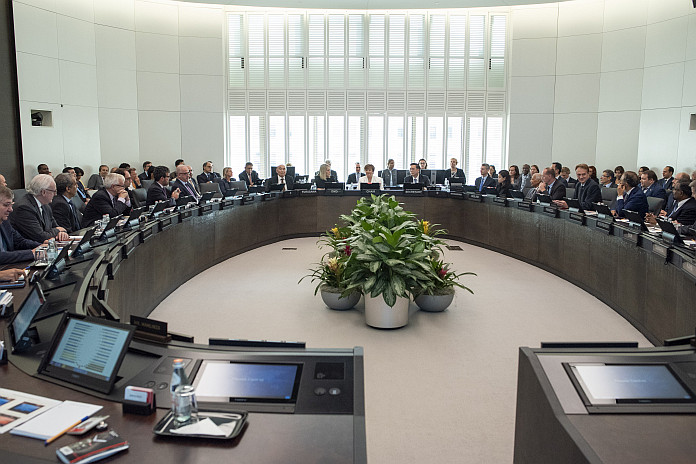WASHINGTON, USA – On November 2, 2020, the executive board of the International Monetary Fund (IMF) concluded the Article IV consultation with Mexico.
Mexico has been hit hard by COVID-19. Official statistics indicate that over 85,000 lives have been lost. About 12 million workers lost their jobs, many of whom came from the informal sector, out of which around 4 million have not returned to the workforce. The share of the population in working poverty jumped from 36 to 48 percent, as of June.
Output is expected to decline by 9 percent in 2020, the steepest contraction since the Great Depression. It is expected to recover modestly going forward. Although inflation has edged up on account of exchange rate passthrough and supply disruptions, it is projected to decline gradually as domestic demand remains suppressed by labor market dislocation, wealth effects, and concerns about the path of the pandemic.
The authorities responded to the pandemic by increasing health spending and supporting households and firms. They provided loans, reallocated some expenditure items, front-loaded spending for social pension payments to the elderly and disabled, and accelerated procurement processes and VAT refunds, among other actions. The authorities also implemented tax policy measures and introduced tax administration measures to increase tax collections. Monetary policy started easing last year and accelerated following the pandemic for cuts totaling 400 basis points, reducing the policy rate to 4.25 percent.
The central bank also expanded several facilities, with access up to 3.3 percent of GDP, to support market functioning and credit provision. The flexible exchange rate has facilitated absorption of shocks. Comfortable international reserves, access to the US Federal Reserve swap line, and the IMF’s Flexible Credit Line have bolstered the ability to withstand external stress.
Executive board assessment
Executive Directors generally agreed with the thrust of the staff appraisal. They commended the authorities for taking timely action to mitigate the impact of the pandemic on peoples’ health and the economy, and for maintaining very strong policies and institutional policy frameworks. They noted that the economic recovery is expected to be gradual and that, against the backdrop of considerable risks and uncertainty over the evolution of the pandemic, the large social and economic costs are likely to persist.
Directors emphasized the importance of limiting the damage from the pandemic, promoting a robust recovery, and pursuing strong, durable, and inclusive growth. Continued close engagement and dialogue between the authorities and staff on policy options will be important.
Most directors recommended a further temporary, well-communicated, and targeted near-term fiscal support, with due consideration of the country’s circumstances and safeguarding medium-term fiscal sustainability. A few of these directors cautioned that limited fiscal support could lead to greater pressure on public finances through a deeper economic contraction. A few other directors, however, saw the authorities’ stance as prudent, given the uncertain path of the pandemic.
Directors generally saw the need for announcement of a credible medium-term tax reform to be implemented once the recovery is underway to bolster the space for providing near-term support, close fiscal gaps, lower public debt, and finance needed investment and social spending. A number of directors suggested that the tax reform plans should be announced once a firm recovery is in place.
Directors welcomed the authorities’ recent steps to improve tax administration. They recommended broadening the tax base, raising subnational taxes, and reducing VAT gaps while strengthening social safety nets. They also welcomed the authorities’ pension reform proposal, while urging them to consider complementary measures to mitigate labor market informality. Directors emphasized further reprioritizing public spending to promote inclusive growth by strengthening social protection and increasing public investment. They urged the authorities to revisit Pemex’s business strategy and further reform its governance.
Directors considered that the actions of the central bank have supported the functioning of financial markets and the economy. They noted that the flexible exchange rate has facilitated the absorption of shocks, while comfortable international reserves, access to the US Federal Reserve swap line, and the Fund’s Flexible Credit Line have bolstered the ability to withstand external stress. A number of directors considered that there may be scope for further monetary policy support, while safeguarding financial stability.
Many other Directors, however, supported a more cautious approach, given increased inflation and the potential tradeoffs. Directors recommended continued close monitoring of risks in the banking sector and upholding minimum regulatory and supervisory standards while using the inherent flexibility of the framework.
Directors emphasized that steadfast implementation of structural reforms is key to delivering lasting improvements in investment and productivity and to reaping the benefits of the USMCA trade agreement. They urged the authorities to forcefully tackle labor market informality, advance governance and AML/CFT efforts, enhance public investment efficiency, improve access to credit, and leverage private involvement in the energy sector. Directors also encouraged consideration of a nationwide unemployment benefits system.





